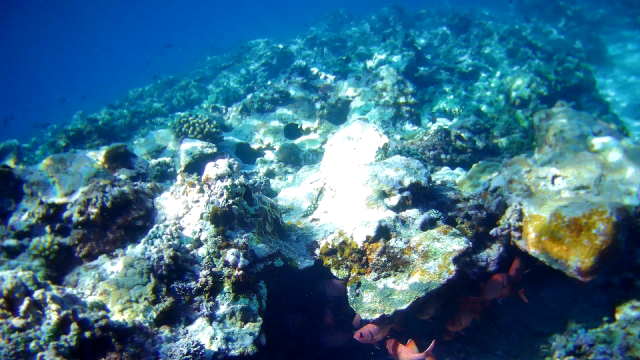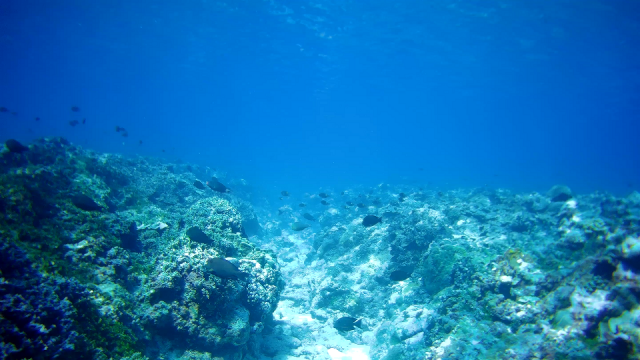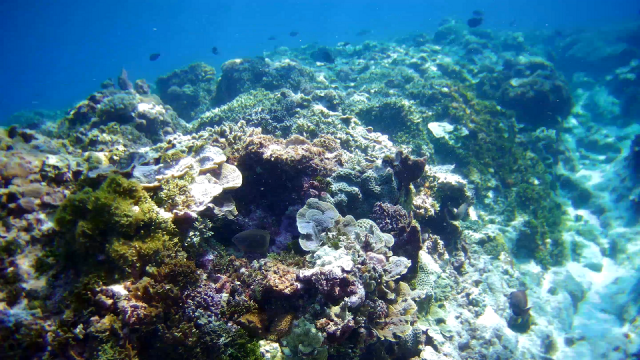Poor condition of Kalayaan Island Group reefs associated with human activities — scientists

Scientists from the University of the Philippines' Marine Science Institute who conducted research and exploration at the Kalayaan Island Group in the West Philippine Sea in April and May 2019 discovered what could possibly be the result of abusive human activities: deteriorating and destroyed coral reefs.
This and other findings are still being collated by the group, led by the institute's chief scientist Dr. Deo Florence Onda.
"Madaming parte nung reefs natin sa Kalayaan Island Group doon sa ilang isla talagang sira na sila," Onda told GMA News.
"Ibig sabihin 'yung coral cover, kung gaano sila karami, talagang mababa. Primarily you can associate it with direct human activities."
Two areas in the Kalayaan Island Group—also known as the Spratly Islands—where the scientists discovered the poor condition of coral reefs are Sabina Shoal and Pag-asa Island.


Using sophisticated equipment, the marine scientists who conducted a coral and fish survey saw crater-like fractures in some large corals—indicators that dynamite fishing occurred there, and highlighting the need for better management and conservation efforts in the region.
The group further noted that some reefs that had been presumed to be buffered from disturbance also showed similar composition, suggesting that these may also actually be vulnerable to human activity.
"Marami ring coral reefs patay; pinapalibutan sila or natatakpan sila ng lumot, at namatay 'yung reef. Ibig sabihin baka merong cyanide fishing na nangyari kaya sila namatay, at marami rin na talagang pudpod ang corals, so baka binabagsakan ng angkla," Onda said.
The West Philippine Sea is a biodiversity hotspot and a known source of fish and corals. The declining condition of its reefs could also affect the abundance and diversity of fish and corals in other reefs.
The condition of poorly managed coral reefs is also believed to have an effect on the quality and quantity of fish and the marine food chain in general.
"Ang pagliit ng mga naoobserbahan nilang laki ng isda, ibig sabihin 'yung mga dapat na mas malalaki na nakikita nila dati hindi na nila masyadong nakikita ngayon, mas maliliit na 'yung sizes," said Onda.
Very few taklobo (giant clams) were also found in the area, with the ones that were there also showing signs of abuse.
"Talagang nakita ko binuksan siya tapos iniwan 'yung shell niya, so hina-hunt siya I think for meat," said Onda.
Chinese vessels
During the marine expedition, the scientists also saw a number of Chinese vessels still stationed at Pag-asa island.
The scientists, however, stressed that they are not saying China is behind the poor condition of the reefs.
"Hindi talaga namin mapo-point out kung sino anong grupo, kaninong bansa [ang responsable]," Onda said.
"Marami tayong nakitang foreign vessels—merong galing Vietnam at may nakita tayong madaming Chinese vessels—pero meron ding mga Filipino fishermen."
Onda said that the West Philippine Sea including the Kalayaan Island Group is important not just for marine biodiversity but also as a possible source of medical plants. And despite the poor condition of the reefs, the scientists noted that there are indications of an increase in seaweed and sea grass in the island group.
Tribunal victory
On July 12, 2016, President Rodrigo Duterte's first month in office, the Philippines scored a victory against China in a landmark ruling at an international tribunal that invalidated Beijing’s massive claims in the South China Sea.
The tribunal ruled, among others, that
- China's "nine-dash line" is invalid;
- reclaimed islands have no exclusive economic zone;
- Chinese law enforcement vessels unlawfully created a serious risk of collision when they physically obstructed Philippine vessels;
- China's large-scale land reclamation has caused severe harm to the coral reef environment and violated its obligation to preserve and protect fragile ecosystems; and
- island building should have stopped during the dispute process.
The 501-page ruling was handed down in The Hague, Netherlands, more than three years after the case was filed by the Philippines in January 2013 during the term of President Benigno Aquino III. — BM, GMA News




